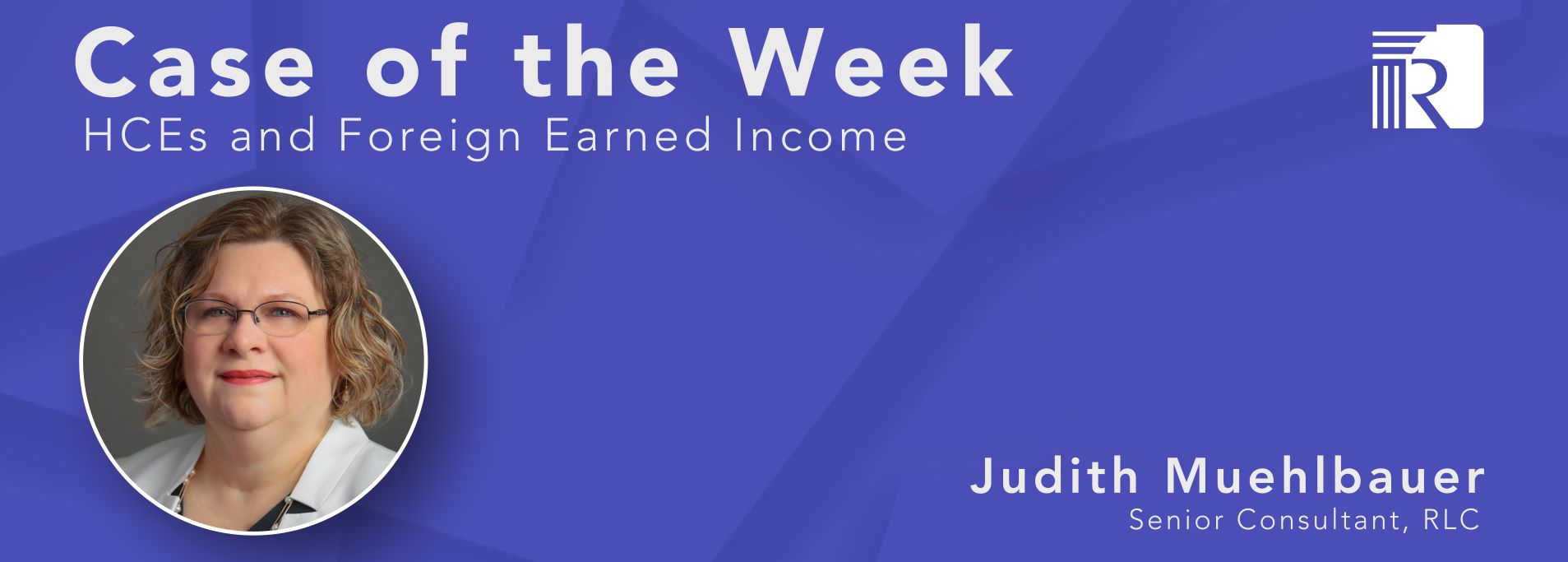
HCEs and Foreign Earned Income
Depending on the specifics of the case, it may be necessary for the plan to include a worker’s foreign earned income in compensation when determining whether the individual is an HCE for plan purposes.
Welcome to the Retirement Learning Center’s (RLC’s) Case of the Week. Our ERISA consultants regularly receive calls from financial advisors on a broad array of technical topics related to IRAs, qualified retirement plans and other types of retirement savings and income plans, including nonqualified plans, stock options, Social Security and Medicare. This is where we highlight the most relevant topics affecting your business. A recent call with a financial advisor in Utah is representative of a common question on foreign earned income.
“Do we need to add a participant’s foreign earned income to their U.S. earned income when determining highly compensated employee (HCE) status after they’ve moved from a foreign subsidiary to a U.S. subsidiary?”
Highlights of the discussion on HCEs and foreign earned income
Depending on the specifics of the case, it may be necessary for the plan to include a worker’s foreign earned income in compensation when determining whether the individual is an HCE for plan purposes. There is an exception, however. Read on for more details.
The definition of compensation the plan must use to determine HCE status is found on page 657 in Temporary Treasury Regulation, 1.414(q)-1T, Q&A 13, which states, “compensation” for HCE determination means “… compensation within the meaning of section 415(c)(3) without regard to sections 125, 402(a)(8), and 402(h)(1)(B) and, in the case of employer contributions made pursuant to a salary reduction agreement, without regard to section 403(b).” Therefore, compensation includes elective or salary reduction contributions to a cafeteria plan, cash or deferred arrangement or tax-sheltered annuity.
In addition, the definition of compensation found in IRC § 415(c)(3)(A)) includes all compensation paid by the “employer.” Since the employer in this context includes foreign companies in the controlled group, the plan may not automatically exclude compensation from these foreign companies when determining HCE status. Furthermore, according to Treas. Regs. Treas. Reg. 1.415(c)-2(g)(5), the determination of whether an amount is treated as compensation under paragraph (b)(1) or (2) of Section 415 is made without regard to the exclusions from gross income under sections 872, 893, 894, 911, 931, and 933. In plain English, this means 415 compensation includes foreign earned income even if it is not included in gross income for tax purposes.
There is an exception to the general requirement to include foreign income in the determination of HCE status found in clause ii of paragraph 5 cited directly above. This exception provides for the ability to exclude compensation earned while the nonresident alien was not eligible for the plan, provided the nonresident alien has no U.S. source income for the year. Keep in mind the plan must apply this rule uniformly to all similarly situated employees.
Conclusion
If a person working for a multinational company transfers to a U.S. company in that multinational’s controlled group, and has foreign-source compensation and U.S.-source compensation in the same year, and is eligible for the U.S. plan, the plan administrator will need to convert the value of the foreign compensation to dollars for the purpose of determining whether that employee should be treated as an HCE. However, no amounts of foreign-source income need be considered if the employee is not eligible for the U.S. based plan and has no U.S. source income.
